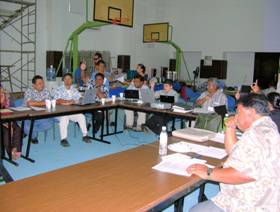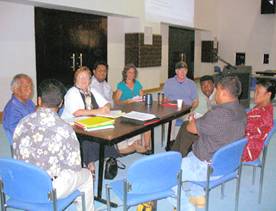 |
College of Micronesia-FSM Federated States of Micronesia |
|
| Computing · Directory · Home · Jobs · Library · News |
| September - Palikir, Pohnpei | ||||
M E M O R A N D U M September 05, 2007 To: All Concerned From: President, COM-FSM Subject: President’s Update #298 COM-FSM Board of Regents The COM-FSM Board of Regents concluded a two day regular meeting at the National Campus on August 28, 2007. Four members of the BOR attended the meeting and paid a courtesy call to the FSM President at 10:00 a.m. on August 27, 2007. The BOR member from the State of Yap was not in attendance at this meeting as that seat is still vacant. However, Governor Anefal of Yap State has informed President James that a nominee has been sent to the FSM President’s Office for his blessing and the FSM Congress’ confirmation. We hope the FSM Congress can confirm Yap State nominee so the nominee can attend an upcoming Board Training later this year and the BOR meeting in December 2007. Program Planning Conference The College hosted a Programs Planning Conference on August 30-31, 2007 in the FSM-China Friendship Sport Center at the National Campus. The Programs Planning Conference addressed priorities for programs and services over the next three to five years. What programs and services would best allow the college to meet its mission while maintaining and improving quality of programs and services? Details regarding some of the questions that were addressed during the conference included: what are acceptable standards for financing of programs?; how do we ensure quality of the programs?; how do we ensure quality of the same programs and services offered at different campuses?; what are the acceptable levels of enrollment, graduation and retention? Campus Directors and Vice Presidents were requested to consider ways and resources to maximize participation of key faculty and staff. Campus Directors and Program Heads were encouraged to engage their faculty and staff in discussions on programs and quality needs for the college prior to the meeting at the end of August. Because discussions and decisions needed to be data driven, it was requested that each department, program, campus bring as much information on existing programs and future programs as possible. Summary of Recommendations from the conference included the following:
Over 90 participants from the College System and stakeholders attended the conference.
Updates on World Park The World Park has made significant progress since April 2007. To date Chuuk, Kosrae and Pohnpei States have passed support resolutions. Chuuk State Legislature passed an overwhelming support resolution out of the House. The Chuuk Senate is reportedly about to make this a joint resolution when they convene again in September 2007. It is our understanding that the Chuuk Senate is making minor adjustments to the resolution wording at this time and will vote in the September session In May the COM-FSM World Park Coordinator traveled to Chuuk State and joined the COM-FSM Chuuk Campus Director/World Park Coordinator Joakim Peter in hearings at both the Chuuk House and Senate. The Governor appointed Chuuk State World Park Planning Coordinator Mr. Mason Fritz joined the two COM-FSM World Park Coordinators in the hearings. Both hearings were deemed as successful as the resolution outcomes would attest. Chuuk State is also working to secure funding for the proposed 12 months planning process. In April COM-FSM hosted a World Park breakfast and Governor Weilbacher of Kosrae was able to view the World Park presentation. At the conclusion of the presentation Governor Weilbacher stated support for the initiative. On April 20, 2007 the Pohnpei Legislature appropriated $93,000 for World Park planning. This amount is in excess of the requested appropriation. Pre-planning meetings have begun in Pohnpei lead by the Pohnpei World Park Planning Coordinator Lt. Governor Yakana. The official start of the 12 month Pohnpei State World Park planning is scheduled to begin on October 15, 2007. The COM-FSM Pohnpei State World Park planning contract is in process at this time. In June the COM-FSM World Park Coordinator traveled to Michigan State University to engage in planning meetings and to brief administration officials on World Park development progress. At this meeting the question of funding for planning was discussed and concern was voiced by the COM-FSM World Park Coordinator that lack of funding in at least two states may jeopardize the development of the World Park. MSU Dean offered up to $300,000 in planning assistance from MSU to be applied to the 4 FSM States planning for the World Park. This funding will enable the States of Kosrae and Chuuk in particular to proceed with World Park planning through a partial funding appropriation if these states cannot appropriate full funding as per the World Park planning process. Michigan State University sent their World Park Coordinator Dr. Richard Paulsen to Pohnpei on July 31, 2007. Ten days of meetings and presentation by COM-FSM and MSU including the FSM, Pohnpei State, and other officials followed. As a note the World Park initiative is an excellent fit with the Micronesian Challenge. This point is continually stressed in all World Park presentations. In summary the World Park initiative is making good progress. Strong public engagement and understanding is one of the aims of planning and will help stakeholders at the grassroots level to understand and support the concept and to also understand their ownership and roles in the concept. Feasibility Plan on 4 Year College The key staff at the College of Micronesia-FSM met with President Manny Mori and his Chief of Staff, the Honorable Sabino Asor during the month of July 2007 regarding converting the National Campus into a 4 Year College. After discussing the idea of converting the National Campus into a 4 Year College (with selected programs) and other concerns from President Mori regarding graduates of the College, the College representatives were also asked to submit a feasibility plan on the 4 Year College in December 2007. The program planning workshop at the end of this month will also be addressing the options that the College will be reviewing for the 4 year college. How COM-FSM Can Ensure Academic Quality of its Programs? Experts like Peter T. Ewell and organizations like Association of Governing Boards of Universities and Colleges have reported that Community Colleges and 4 Year Colleges can ensure the quality of their programs by doing the following which have also been partially implemented at the COM-FSM:
Fall Semester 2007 Enrollment at Campuses The Fall Semester 2007 enrollment at COM-FSM Campuses as of 8/21/07 is as follow:
Total-------------------- 2,292 Asia Pacific Association for Fiduciary Studies The College of Micronesia-FSM is a member of the Asia Pacific Association for Fiduciary Studies. Last year this organization had its annual meeting in the Philippines and a delegation of three including a student attended that conference. Mr. Sergio Keller, a third year student in Accounting at the National Campus was selected to represent the College of Micronesia-FSM at the conference. His essay was based on his “Experience in Stock Market Investment”. VPA Charles Musana, VPIA Jean Thoulag, and Chairperson for the Business Administration Division Joe Felix, are coordinating this year’s competition. COM-FSM will nominate a chaperone and a student with the best essay to attend this conference on October 18-19, 2007 in Manila, Philippines. All expenses for the chaperone and student will be paid by the Asia Pacific Association for Fiduciary Studies. Thank you.
|

